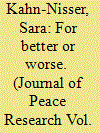| Srl | Item |
| 1 |
ID:
170024


|
|
|
|
|
| Summary/Abstract |
International regulatory agreements depend largely on self-reporting for implementation, yet we know almost nothing about whether or how such mechanisms work. We theorize that self-reporting processes provide information for domestic constituencies, with the potential to create pressure for better compliance. Using original data on state reports submitted to the Committee Against Torture, we demonstrate the influence of this process on the pervasiveness of torture and inhumane treatment. We illustrate the power of self-reporting regimes to mobilize domestic politics through evidence of civil society participation in shadow reporting, media attention, and legislative activity around antitorture law and practice. This is the first study to evaluate systematically the effects of self-reporting in the context of a treaty regime on human rights outcomes. Since many international agreements rely predominantly on self-reporting, the results have broad significance for compliance with international regulatory regimes globally.
|
|
|
|
|
|
|
|
|
|
|
|
|
|
|
|
| 2 |
ID:
178725


|
|
|
|
|
| Summary/Abstract |
Does it matter whether human rights (HR) shaming is accompanied by acknowledgments of reforms and progress? Do such acknowledgments weaken or strengthen the impact of shaming? Rulers decide whether to oppress or to comply with HR treaty obligations by considering what compliance entails and by weighing the internal and external costs and benefits of oppression. Research shows that HR shaming alters such considerations and is associated with changes in HR protection levels. Can the same be said of faming? This article examines three forms of HR reporting: faming, which focuses on positive developments; shaming, which focuses on problematic HR practices; and scrutiny, which combines shaming and faming. The article analyzes the association between shaming, faming, and scrutiny by UN treaty bodies, on the one hand, and oppression on the other. The potential associations are conceptualized as mitigation, backsliding, and specification. The analysis finds that shaming with no faming and faming with no shaming are each negatively associated with HR protection. Scrutiny, the combination of shaming and faming, is positively associated with subsequent HR protection levels, and the higher the level of scrutiny the higher the subsequent level of HR protection. The article argues that the reason for this association is that the combination of shaming and faming helps policymakers understand how to properly implement their treaty obligations and how to improve HR protection. The article draws policy and theoretical implications including the need for balanced and detailed HR reporting, and the importance of learning in HR advocacy.
|
|
|
|
|
|
|
|
|
|
|
|
|
|
|
|